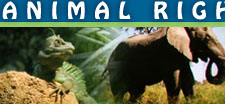
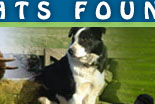
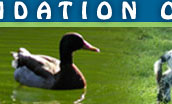
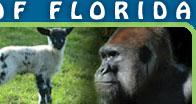
|
“Nothing will benefit human health and increase chances for survival of life on Earth as much as the evolution to a vegetarian diet.”—Albert Einstein Have you noticed? Vegetarian characters are now common in movies and on television. Your local restaurant now has vegetarian (and even vegan!) selections on the menu . . . the newspaper has a weekly vegetarian column . . . vegetarian cookbooks are best-sellers. A vegetarian is someone who does not eat the flesh of animals - chickens, cows, pigs, fish, horses, lobsters, ostrich, or other animals. Almost 17 million Americans consider themselves vegetarian, and this number increases by about 19,000 every week. A vegan diet is free of all animal products, including eggs, butter, and milk. An estimated 500,000 Americans are vegans. People become vegetarian or vegan for a variety of reasons - to be healthier, to help animals, to preserve the environment, for religious reasons, etc. In many countries, vegetarian meals are common. In fact, in many cultures, vegetarianism has been a way of life for centuries. Health Improved health is often the biggest motivation for people to choose a diet without animal products. A diet high in meat, eggs and dairy products has been linked to heart disease, high blood pressure, obesity, and some forms of cancer. Antibiotics and hormones fed to livestock, as well as pesticide residue, often are passed on to consumers of meat and dairy products. Fish can also have high levels of pollutants, like PCBs. The risk of food poisoning - E.coli and Salmonella - from eating animal products is an additional concern. “Some people are still going to want to eat meat … we do agree though that vegetarianism is a healthier diet.”—David Stroud of the American Meat Institute “So you are the people tearing down the Brazilian rainforest and breeding cattle.”—Prince Philip to McDonald’s of Canada For
the Environment “Many things made me become a vegetarian, among them the higher food yield as a solution to world hunger.”—John Denver For
the Animals For many people who love animals, the institutionalized cruelty and unnecessary killing of animals for food is all the reason needed to become vegetarian, or better yet, vegan. When people order meat at a restaurant, or purchase meat at the supermarket, the slaughterhouse is most likely the last thing they are thinking of. Bloody slaughterhouses, crowded feedlots, abusive livestock haulers, and nightmarish factory farms are the realities of meat. “Since visiting the abatoirs of South France I have stopped eating meat.”--Vincent Van Gogh “If any kid ever realized what was involved in factory farming they would never touch meat again. I was so moved by the intelligence, sense of fun and personalities of the animals I worked with on Babe that by the end of the film I was a vegetarian.”—James Cromwell Chickens used for egg production are stuffed into wire cages for their entire lives - they can never stretch their wings. Intensive milk production maximizes yield for profit, at the expense of the cow, whose male calves are sold to become veal, and who herself will end up one day at the slaughterhouse. These animals never get a breath of fresh air until they are crowded onto trucks, headed for slaughter. “Martin Luther King taught us all nonviolence. I was told to extend nonviolence to the mother and her calf.”—Dick Gregory It is high time we all realize that the suffering we cause to animals, in the name of food production, is simply unacceptable in an enlightened society. “People get offended by animal rights campaigns. It’s ludicrous. It’s not as bad as mass animal death in a factory.”—Richard Gere Whether your reasons are based in health, the environment, animal protection, or religion, there is no better time than now to Go Veg! |

1431 N. Federal Highway | Fort Lauderdale, FL 33304 | Tel. 954-727-ARFF
 It
is easy to get ample amounts of protein, carbohydrates, and other
vital nutrients from a vegetarian or vegan diet. For example, calcium
for strong bones can be found in calcium-rich vegetables and in
fortified foods. The proper daily amount of iron is easily found
in beans, lentils, dates and other foods. A good rule to follow
is to eat enough calories each day from a wide variety of foods,
including vegetables, beans, fruits, nuts, whole grains and pasta,
and soy products like tofu. A vegetarian or vegan diet can be an
empowering and exciting choice. Virtually any meat-based dish can
be prepared with vegetables or soy substitutes. Try cheeseless or
soycheese pizza with lots of vegetables and extra sauce. Foods like
burritos, pasta dishes and soups are often naturally meatless. Restaurants
like Indian, Chinese, Thai, Italian and Mexican have numerous vegetarian
selections, or ask your favorite restaurant for meatless options.
Add variety to your diet. Enjoy traditional favorites or explore
new vegan foods. There’s never been a better time to Go Veggie!Environment
It
is easy to get ample amounts of protein, carbohydrates, and other
vital nutrients from a vegetarian or vegan diet. For example, calcium
for strong bones can be found in calcium-rich vegetables and in
fortified foods. The proper daily amount of iron is easily found
in beans, lentils, dates and other foods. A good rule to follow
is to eat enough calories each day from a wide variety of foods,
including vegetables, beans, fruits, nuts, whole grains and pasta,
and soy products like tofu. A vegetarian or vegan diet can be an
empowering and exciting choice. Virtually any meat-based dish can
be prepared with vegetables or soy substitutes. Try cheeseless or
soycheese pizza with lots of vegetables and extra sauce. Foods like
burritos, pasta dishes and soups are often naturally meatless. Restaurants
like Indian, Chinese, Thai, Italian and Mexican have numerous vegetarian
selections, or ask your favorite restaurant for meatless options.
Add variety to your diet. Enjoy traditional favorites or explore
new vegan foods. There’s never been a better time to Go Veggie!Environment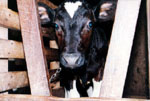 The
numbers are staggering. An estimated 9 billion animals are killed
for food each year in the United States. This number does not include
fish! In today’s modern factory farms, where meat, dairy products
and eggs are produced, animals are treated like machines. Within
days of birth, pigs are separated from their mothers, and have their
tails cut off; males are castrated. Pigs are kept in stalls so tiny
that they cannot turn around.
The
numbers are staggering. An estimated 9 billion animals are killed
for food each year in the United States. This number does not include
fish! In today’s modern factory farms, where meat, dairy products
and eggs are produced, animals are treated like machines. Within
days of birth, pigs are separated from their mothers, and have their
tails cut off; males are castrated. Pigs are kept in stalls so tiny
that they cannot turn around.